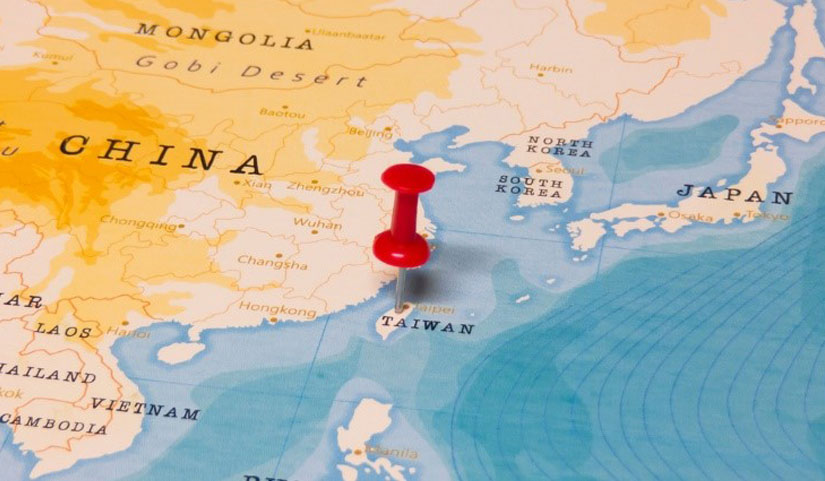Taiwan: The Ticking Time Bomb

Just how long before China invades Taiwan, and what does it mean for the United States?
It could be any day according to news reports. On Sept. 12, Taiwan warned that Chinese military had sent 22 Chinese warplanes and 20 warships in the Taiwan Strait. It stated that 13 of the planes flew over the median line, a line that has until now been a barrier for military exercises.
Americans agree on few things these days, but most believe a Chinese invasion could be disastrous for the United States. Taiwan is already fortifying beaches against an invasion, as China continues miliary exercises around the island. Evidence emerged earlier this year that China might already have measures in place to handicap the United States from coming to Taiwan’s aid.
Taiwan, officially known as the Republic of China, is a small island country about the size of Maryland with a population of about 23 million. It was formed in 1949 when the Republic of China government relocated there from mainland China during the Civil War and maintains its independence with a democratically elected government. Meanwhile, the People’s Republic of China insists Taiwan belongs to China and vowed to retake the island, by force if necessary.
 Although Taiwan is a critical U.S. trade partner, it is mostly known as a supplier of semiconductor chips. Its chips power nearly a third of the new computing power in the world. Everything from iPhones to laptops, cars and utility company infrastructures all rely on these chips. If China were to suddenly takeover, it could cripple multiple industries. Taiwan is also a key strategic partner, allowing the United States a foothold to defend partner countries in the world, including Japan and the Philippines. Biden has continued pushing the political equivalent of “Have your cake and eat it, too” which supports the “One China” policy, while at the same time continuing its support an of independent Taiwan.
Although Taiwan is a critical U.S. trade partner, it is mostly known as a supplier of semiconductor chips. Its chips power nearly a third of the new computing power in the world. Everything from iPhones to laptops, cars and utility company infrastructures all rely on these chips. If China were to suddenly takeover, it could cripple multiple industries. Taiwan is also a key strategic partner, allowing the United States a foothold to defend partner countries in the world, including Japan and the Philippines. Biden has continued pushing the political equivalent of “Have your cake and eat it, too” which supports the “One China” policy, while at the same time continuing its support an of independent Taiwan.
China Malware and Spy Balloons
In July, the New York Times reported that U.S. Government Intelligence officials were frantically searching for malware that Chinese hackers had allegedly buried in U.S. power grids, communication system and water supplies linked to military bases in the United States and around the world. The belief is that the malware would come into play if the United States were ever to take military action against China in retaliation against a Taiwan attack. Evidence of the malware came to light in May, and lawmakers briefed on it have said that it could have the potential to not only interfere with a military force but could also slow or cut off water and power supplies to U.S. citizens as well. And let us not forget the Chinese spy balloon earlier this year that Biden allowed to float across the entire Continental United States and transmit data back to China, before shooting it down in the Atlantic.
Just days ago, Biden dismissed the China threat to Taiwan. After a gathering of the G20 leaders in India, Biden traveled to Vietnam, where he stated at a Hanoi press conference that China’s economic woes have left Chinese President Xi Jinping with “his hands full.” “I don’t think it’s going to cause China to invade Taiwan, matter of fact the opposite, probably doesn’t have the same capacity as it had before” he stated.
Most people aren’t buying it. Mike Gallagher, chair of the U.S. House of Representatives’ Select Committee on the Strategic Competition Between the US and the Chinese Communist Party, disagrees. According to the Taipei Times, at a U.S. Council on Foreign Relations event in New York, Gallagher said, “I just think it’s equally as plausible that, as China confronts serious economic and demographic issues, [Chinese President] Xi Jinping could get more risk accepting, and could get less predictable and do something very stupid.” He added, China “definitely wants to become the regional hegemonic, which necessarily means cutting up our [the U.S.] alliances and partnership structure ... [and] also necessarily entails taking over Taiwan at some point.”
Let us hope it doesn’t come to war, but the situation is escalating daily. China reported a few days ago, that it was on high alert after ships from the United States and Canada sailed through the Taiwan Strait, and Japan and other partner countries are beefing up their defenses to Taiwan. Whatever you do, keep a keen eye on Taiwan.
JOIN MAMMOTH
Shop your values and save!
Categories
Popular Tags
Archives
- February 2025 (2)
- January 2025 (11)
- December 2024 (10)
- November 2024 (8)
- October 2024 (7)
- September 2024 (6)
- August 2024 (7)
- July 2024 (7)
- June 2024 (6)
- May 2024 (8)
- April 2024 (5)
- March 2024 (7)
- February 2024 (9)
- January 2024 (6)
- December 2023 (5)
- November 2023 (8)
- October 2023 (5)
- September 2023 (4)
- August 2023 (8)
- July 2023 (5)
- June 2023 (5)
- May 2023 (6)
- April 2023 (5)
- March 2023 (3)
- February 2023 (2)
- January 2023 (5)
- December 2022 (6)
- November 2022 (7)
- October 2022 (2)